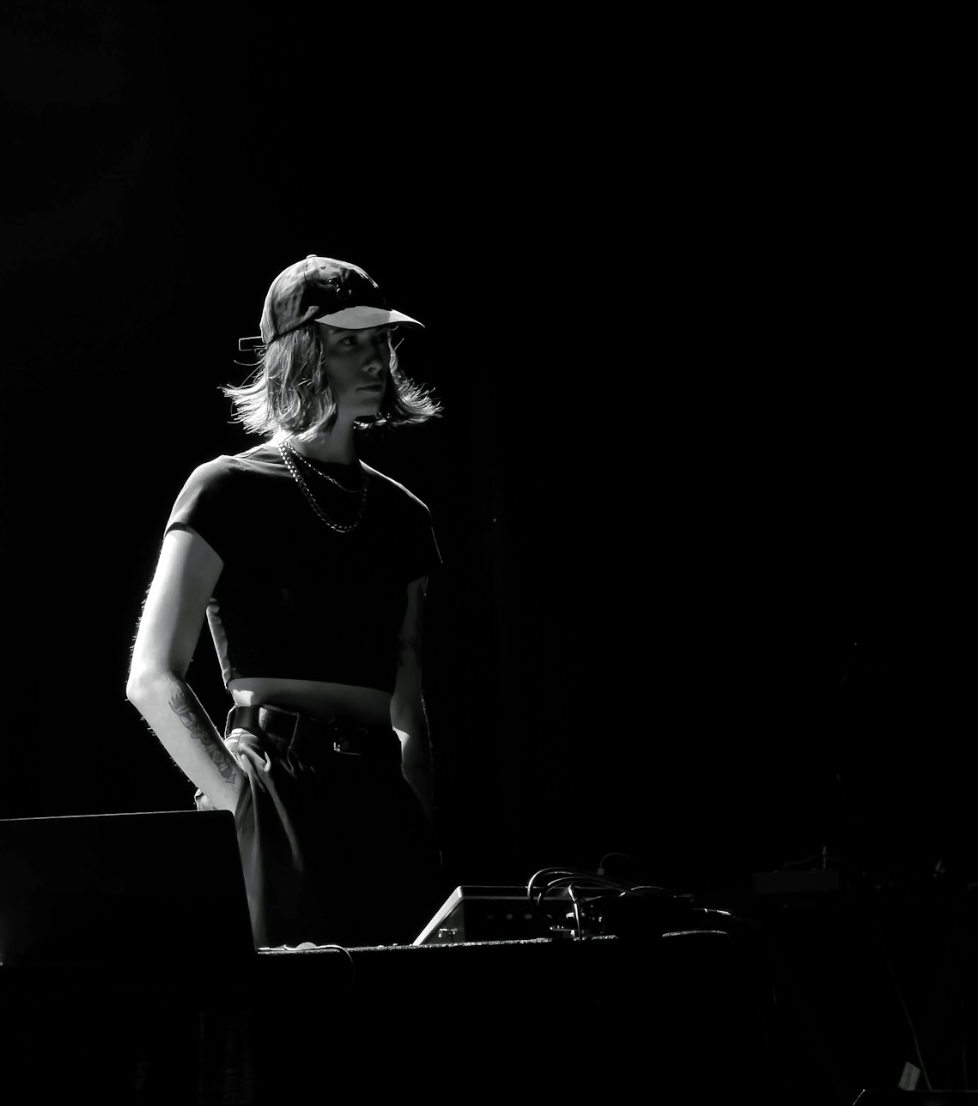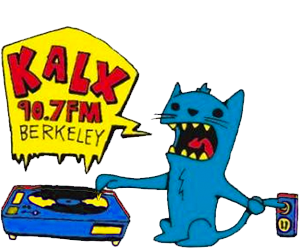Review by Mia Call and photos by Ashlyn Reynolds
If happiness is, as Milan Kundera once wrote, the longing for repetition, then the Canadian electronic pop duo Junior Boys bring the joy. Building upon layers and layers of synth and techno drum sounds to create a comforting, familiar yet new loops, over which they sing sparse lyrics, the band’s dedication to late 80s sound and haunting reverbed vocals remains unchanged in the nearly 20 years they’ve been together. In 2004, their debut LP Last Exit combined raw haunting lyrics with a mathematically precise electronic and synthy funk. Now, nearly 20 years later, the band’s post pandemic Waiting Games keeps the precision and groove of their early releases, featuring a more modern ambient sound–and lots of rad sax solos. This transformation was on full display at the Fillmore this past Tuesday, January 24th, as Junior boys took the stage in SF for the first time in nearly 6 years, alongside opener Claire Rousay.
 Perhaps this penchant for repetition also reflected on the crowd, most of whom were middle aged men in flannels in Patagonia, and who were nearly all decently tipsy. When I asked a couple of fans who had gathered early to get a good spot why they were there, most cited nostalgia for their college days. The crowd was lighter than most nights at the Fillmore (one staffer told me they had to cut personnel and close off the top floor because of the underwhelming sales), which meant that when LA-based Claire Rousay took the stage, only a modest 30 or so people stood on the Fillmore’s hardwood dance floors. The possibility of dancing seemed doubtful.
Perhaps this penchant for repetition also reflected on the crowd, most of whom were middle aged men in flannels in Patagonia, and who were nearly all decently tipsy. When I asked a couple of fans who had gathered early to get a good spot why they were there, most cited nostalgia for their college days. The crowd was lighter than most nights at the Fillmore (one staffer told me they had to cut personnel and close off the top floor because of the underwhelming sales), which meant that when LA-based Claire Rousay took the stage, only a modest 30 or so people stood on the Fillmore’s hardwood dance floors. The possibility of dancing seemed doubtful.
Rousay, an experimental artist whose work might be best described as ambient sound-collage mixed with an auto–tuned poetry slam, casually took the stage without introducing herself. Harsh white lights highlighted the simplicity of her set up – a plastic fold up table, with her computer and a couple other electronic music gadgets. She thanked the audience for the light applause and then asked that we all pull up a photo of someone we love on our phone and show it to a stranger standing next to us. The result felt somewhere between middle-school icebreakers and a Fluxus art piece, but the crowd slowly followed the instructions, pulling up pictures of loved ones and explaining who they were, who they were. As

conversations droned on, Rousay began the music; first, synthy sounds and ambient noise, then a couple of obscured voices, then some abrasive ASMR. She wandered around the stage casually as the audience observed, somewhat curious but mostly confused.
The performance crescendoed and fell back to near silence. Sometimes Rousay spoke through a heavily autotuned mic, about mundane tasks, queer sexuality, and crippling loneliness (at one point, she continually repeated, “I have spent half my life giving you a blowjob”). Other times, snippets from podcasts about depressive spirals played over the sounds of chains clinking. Acoustic guitar faded in and out, which was the most musically captivating part, and some of her quips worked. Songs didn’t start or end, they just all flowed into another – the performance was on a different time frame than the typical 3 minute song. At its best, it sounded like a constant creation, as Rousay adjusted machines, using words and sounds to paint an auditory image of being a young trans woman trying to speak her mind. As more people began to trickle into the venue, and the performance continued past the 15 minute mark, the crowd began to grow restless, though I was still enthralled. As she sang over ambient instrumentals and Elliott Smith-like (but autotuned) vocals, she contemplated the struggles of being new  in town, making her loneliness a spectacle as more and more of the audience began to talk over the performance, adding to the ambient sound. She ended the performance with computer-generated voice reading musings on loneliness and how hard it is to make friends at a poetry reading, turning the sound up to almost unbearable volumes, at which point, audience members began actively heckling. Rousay stared straight out into the audience, unflinching, as the computer finished its reading. My ears were ringing. Then, with her performance over, she began packing up her table, a self-satisfied smile on her face.
in town, making her loneliness a spectacle as more and more of the audience began to talk over the performance, adding to the ambient sound. She ended the performance with computer-generated voice reading musings on loneliness and how hard it is to make friends at a poetry reading, turning the sound up to almost unbearable volumes, at which point, audience members began actively heckling. Rousay stared straight out into the audience, unflinching, as the computer finished its reading. My ears were ringing. Then, with her performance over, she began packing up her table, a self-satisfied smile on her face.
By the time Junior Boys got on stage, the Fillmore was much more packed (though still relatively sparse). The performing band consisted of singer Jeremy Greenspan, Matt Didemus, and in addition to the original duo also featured a stellar drummer and a saxophone/guitarist, whose names were impossible to find in Junior Boy’s online presence or at the show itself. The four-piece band made the electronic music come to life. Drums drove the songs, creating danceable beats that sounded better than those on the record, and sax solos were absolutely magical, full of energy and utterly captivating. After starting out the set with slower, newer tracks, Junior Boys hit their bread and butter when playing 2004’s “Teach Me How to Fight,” as the crowd finally began to loosen up and dance. Greenspan’s vocals suffered the same, over-reverbed treatment as the records, although live it was impossible to miss his strong, melodic voice. Lyrics, although complex and captivating, came second to the transcending experience of the groove of the music, which made it almost impossible not to dance. The true highlight of the performance was the unn

amed saxophonist and drummer’s contributions, which elevated the music past the level of outdated electronic house music.
The encore brought more face-melting sax solos and grooving rhythms, and the audience danced in aging-limb friendly manners. The crowd might not have been ready for the abrasive, discordant cacophony of modern queer life as presented by Claire Rousay, but they were more than ready to jive to the familiar sounds of their youth, revisiting the glory days of early 2000s electronica. But, at least for me, Rousay was able to capture the present. And as for the negative reaction from the audience, she doesn’t seem too concerned. A recent tweet of hers read “[I’ve] been singing songs on tour and no audience has retaliated yet.” In a world usually so violent towards queer women, she seemed to take that as a win.


